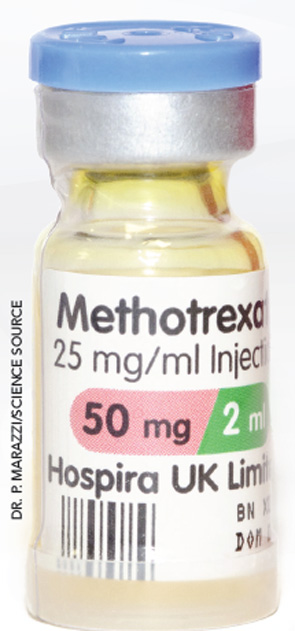
BOSTON—Methotrexate is still the cornerstone of therapy for treating rheumatoid arthritis, whether in combination with other drugs or as a monotherapy. At the ACR/ARHP Annual Meeting in Boston in November 2014, two leading experts in methotrexate research shared their insights about successfully managing RA patients with this affordable, accessible medication.
“This is a fairly simple molecule that has not only changed the field of treating a number of malignancies, but has also changed the field of treating chronic rheumatic diseases, particularly RA,” said Michael E. Weinblatt, MD, the Riedman Professor of Medicine at Harvard Medical School and co-director of clinical rheumatology at Brigham and Women’s Hospital in Boston.
Dr. Weinblatt and Joel M. Kremer, MD, professor of medicine at Albany Medical College in Albany, N.Y., discussed Clinical Issues Associated with the Use of Methotrexate on Nov. 18. Methotrexate remains the standard of care in RA management and is the best-studied disease-modifying antirheumatic drug (DMARD) to date, with more trials and long-term clinical experience than any other RA therapy. There is resurgent interest in methotrexate due to its use in combination with biologic drugs, said Dr. Weinblatt. They shared their views on using methotrexate in RA patients to improve functional status and radiographic progression of RA, lower disease activity scores and prevent adverse events.
Combination Anchor
Methotrexate may help RA patients get off glucocorticoids and nonsteroidal antiinflammatory drugs (NSAIDs), and may positively impact mortality, a major concern in RA, by “having a fairly strong impact on inflammation,” said Dr. Weinblatt. It’s even more effective as an anchor drug in combination therapy. “Methotrexate in combination, whether with oral synthetic drugs or with biologics, has generally demonstrated superiority to monotherapy.”
Used in combination, methotrexate may increase the efficacy of biologics, especially TNF inhibitors and rituximab. It may increase the serum levels of selective biologics, such as adalimumab. In one study, a dose of methotrexate below 7.5 mg per week was not as effective as higher doses when combined with adalimumab, suggesting a dose threshold with combination therapy, Dr. Weinblatt said.
Methotrexate toxicity is a common concern in RA, but the duration of exposure to the drug is the determining factor, said Dr. Kremer. Prolonged exposure to a serum level of methotrexate above 0.05 µM for more than 24 hours will result in a cytotoxic effect of rapidly dividing cells. Renal compromise may extend the half-life of methotrexate polyglutamates, he said.
